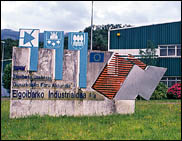
 |

|
In
a market economy, production decisions are made basically by the
companies. Thus these institutions become important agents in the
productive activity and, consequently, play an essential role in
regional development.
|
Therefore
it is not possible for a society to advance economically if its
entrepreneurial tissue is not consolidated and in permanent evolution,
adjusting to the requirements that society demands in relation to
the production of the goods and services that it needs.
|
|
|
|
||
|
Having
highlighted the important role that the entrepreneurial tis-sue
must play in regional development and the social function it must
exercise, we emphasise the importance of policies to support entrepreneurial
activity. They must implement different actions to improve and boost
the course of this activity.

|
Traditionally,
the BCAC developed an important entrepreneurial tissue as a consequence
of its sufficient capacity to generate autochthonic entrepreneurial
projects, the roots of which lie in certain norms of social behaviour
as well as in other internal and external factors that condition
the course of entrepreneurial activities. Currently important breakdowns
in the entrepreneurial tissue are being observed in the Basque Country.
Therefore, it is necessary to foster and drive modernisation in
aspects related to management, produc-tion, commercialisation, etc.
Along this same line, the pressure of competition is manifest among
the companies and the response to the challenge of developing the
Basque economy must be given especially by private initiative, although
the public administrations assume the responsibility of driving
and backing it up with actions that promote and support this response.
|
|
|
|
||
|
The
small and medium enterprise is the main protagonist in the proposed
development strategy. Therefore, policies related to these small
and medium companies will concentrate around axes aiming to increase
competitiveness.
Actions to achieve a greater degree of industrial development must lead towards a greater power and diversification of the productive structure of Basque industry. |
||
|
|
||
|
An
important fact that can strongly mark the type of competition that
Basque companies will have to face is the growing internationalisation
of industry in recent years. This internationalisation strategy
adopted by numerous foreign firms owes to the fact that this is
the only way to grow given the limitations of the near markets as
to their growth expectations and size.
|
Along
other lines, it must be mentioned that, within the actions for promoting
and supporting productive activities, it is necessary to encourage
the development of urbanised industrial land and, in this way, provide
solutions for urban problems through the creation of an offer of
industrial land within the criteria established by urban planning.
|
|
|
|
||
|
The
aim is to relocate firms in industrial complexes, facilitate the
implantation of new companies as well as replace industrial or service
tissue in specific zones. This all obeys the ultimate objective
of improving industrial urbanism and environment as well as increasing
the firms' productivity.
|
El
importe total de las ayudas comunitarias (FEDER, Plan de Reconversión
para Aduanas, fundamentalmente) para el desarrollo de este Eje ha
sido de 3.890,2 millones de ptas.
|
|
| e-mail for making contact |